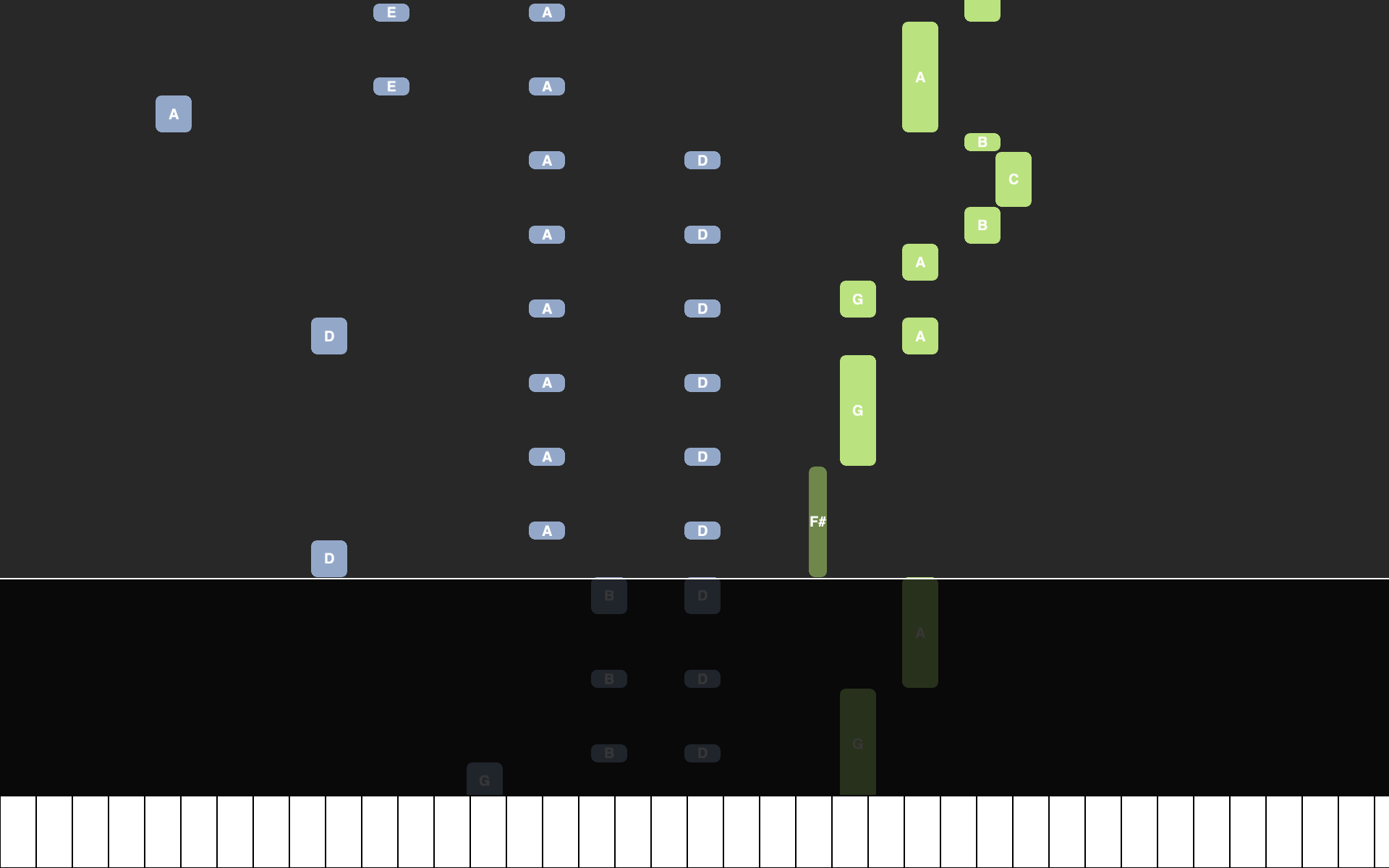accordeon
🪗 Play the accordion with your computer keyboard
Synthesia alternative in Processing

import javax.sound.midi.*;
import java.io.*;
import ddf.minim.*;
import ddf.minim.ugens.*;
import javax.sound.midi.*;
Minim minim;
AudioOutput out;
Synthesizer synth;
MidiChannel[] channels;
int CH0=0, CH1=1;
int BEGIN_Y=400;
int yStep=3; //hmm... lin relation to 60fps?
int curTime;
int yBar;
boolean isPlaying = true;
PShape square, alien;
int y=BEGIN_Y; //-12275;
float scaler=1/50.;
int timeShift = 3560; //1280;
int minNote=40;
int maxNote=80;
int numNotes=maxNote-minNote;
int noteWidth=50;
String fileName = "La Noyee - bewerkt met Reaper midi_export.MID";
ArrayList<Note> notes = new ArrayList();
boolean muteTrack0 = false;
boolean muteTrack1 = false;
int tempo = 85;
float tempoFactor = 1;
void setup() {
//size(1200, 800);
fullScreen(P3D);
alien = createShape(GROUP);
textFont(loadFont("AlBayan-Bold-20.vlw"));
textAlign(CENTER, CENTER);
minim = new Minim(this);
out = minim.getLineOut();
yBar = int(height/1.5);
// try to get the default synthesizer from JavaSound
// if it fails, we print a message to the console
// and don't do any of the sequencing.
try
{
synth = MidiSystem.getSynthesizer();
synth.open();
// get all the channels for the synth
channels = synth.getChannels();
// we're only going to use two channels,
// which we'll now configure to use particular midi instruments.
// but you should have up to 16 channels available.
// for a list of general midi instrument program numbers, see: http://www.midi.org/techspecs/gm1sound.php
channels[CH0].programChange( 21 ); // 5 should be "electric piano 1"
channels[CH1].programChange( 23) ;//21 ); // 33 should be "acoustic bass"
// ok make a sequence with our output and custom Instrument
out.setTempo( tempo );
//out.pauseNotes();
//// remember that time and duration are expressed relative to the tempo.
//// so the first two arguments here mean: on beat 0, play a dotted quarter note.
//note( 0, 1.5, CH1, "D4", 0.8 );
////....
//out.resumeNotes();
}
catch( MidiUnavailableException ex )
{
// oops there wasn't one.
println( "No default synthesizer, sorry bud." );
}
String[] lines = loadStrings("lines.txt");
for (String line : lines) {
notes.add(new Note(line));
}
for (Note n : notes) {
//int x = int(n.octave*noteWidth);
int x = int(map(n.noteNumber, minNote, maxNote, 0, width-200));
int y = -int(n.timestamp*scaler);
int w = (n.name.indexOf("#")>-1) ? noteWidth/2 : noteWidth;
float darkness = (n.name.indexOf("#")>-1) ? .6 : 1;
int h = -int(n.duration*scaler*tempoFactor);
square = createShape(RECT, x, y, w, h, 10);
square.setFill(n.track==1 ?
color(142*darkness, 169*darkness, 204*darkness) :
color(176*darkness, 227*darkness, 111*darkness));
square.setStroke(false);
alien.addChild(square);
}
}
ArrayList<Note> getNotesByTimestamp(int t, int range) {
ArrayList<Note> result = new ArrayList();
for (Note n : notes) {
if (n.timestamp-t>-range && n.timestamp-t<range) {
result.add(n);
}
}
return result;
}
void draw() {
background(40);
shape(alien, 0, y);
fill(255);
for (Note n : notes) {
//float x = n.octave*noteWidth;
float x = map(n.noteNumber, minNote, maxNote, 0, width-200);
float yy = -n.timestamp*scaler;
int w = (n.name.indexOf("#")>-1) ? 25 : 50;
int h = -int(n.duration*scaler);
text(n.name, x, yy+y, w, h);
}
stroke(255);
strokeWeight(2);
line(0, height/1.5, width, yBar);
noStroke();
fill(0, 200);
rect(0, height/1.5, width, height-yBar);
curTime = int((y-yBar)/scaler) + timeShift;
int detectNoteTimeWindow = int(100*tempoFactor);
ArrayList<Note> notes = getNotesByTimestamp(curTime, detectNoteTimeWindow); //(abs(curTime-timeStamp)<50
if (notes.size()>0) {
//println(curTime, notes);
for (Note n : notes) {
int octave = ( n.noteNumber / 12 ) - 1;
String name = n.name;
if (isPlaying && (n.track==1 && !muteTrack0) || (n.track==2 && !muteTrack1)) {
note( 0, n.duration/10000.*tempoFactor, n.track-1, name+octave, 1) ;// );
}
//
//println(n.duration);
}
}
//if (y%20==0) {
// note( 0, .1, CH1, "D4", 0.8 );
//}
if (isPlaying) {
y+=(yStep * tempoFactor);
}
stroke(0);
fill(255);
for (int x=0; x<=width; x+=noteWidth) {
rect(x, height-100, x+noteWidth, 100);
}
}
void mouseWheel(MouseEvent event) {
y -= event.getCount()*3; // *.00001;
//println(y);
}
void keyPressed() {
if (key==BACKSPACE) y=BEGIN_Y;
if (key=='+') yStep++;
if (key=='-') yStep--;
if (key=='[') tempoFactor-=.1;
if (key==']') tempoFactor+=.1;
if (key=='1') muteTrack0=!muteTrack0;
if (key=='2') muteTrack1=!muteTrack1;
if (keyCode==LEFT) y-=250;
//if (keyCode==LEFT) yStep-=50;
//println(timeShift);
if (key==' ') isPlaying=!isPlaying;
}
class Note {
int track, noteNumber, octave, velocity, timestamp, duration;
String name;
Note(String s) {
String[] items = s.split(",");
track = int(items[0]);
timestamp = int(items[1]);
duration = int(items[2]); //in ms?
noteNumber = int(items[3]);
name = items[4];
octave = int(items[5]);
}
String toString() {
return name;
}
}
class MidiSynth implements ddf.minim.ugens.Instrument
{
int channel;
int noteNumber;
int noteVelocity;
MidiSynth( int channelIndex, String noteName, float vel )
{
channel = channelIndex;
// to make our sequence code more readable, we use note names.
// and then convert the note name to a Midi note value here.
noteNumber = (int)Frequency.ofPitch(noteName).asMidiNote();
// similarly, we specify velocity as a [0,1] volume and convert to [1,127] here.
noteVelocity = 1 + int(126*vel);
}
void noteOn(float duration) {
channels[channel].noteOn( noteNumber, noteVelocity );
}
void noteOff() {
channels[channel].noteOff(noteNumber);
}
}
void note( float time, float duration, int channelIndex, String noteName, float velocity ) {
out.playNote( time, duration, new MidiSynth( channelIndex, noteName, velocity ) );
}